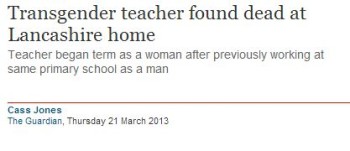
Lucy Meadows was found dead in March, as this Guardian article reports. Recently, a coroner ruled Meadows committed suicide. (Credit: Guardian, screenshot)
UK coroner Michael Singleton called the media coverage of teacher Lucy Meadows, who had a gender reassignment surgery, “sensational and salacious” and said he planned to complain to the government about the “ill-informed bigotry” he said the media showed in reporting on Meadows, according to Press Gazette.
“Shame on all of you,” he said to media outlets attending Meadows’ inquest, where he announced that Meadows had in fact killed herself.
As iMediaEthics wrote last month, Meadows was found dead a few months after having the surgery.
Meadows, a teacher, had been known as Nathan Upton and the decision garnered a lot of media attention after a letter from a teacher at the school to parents about the reassignment ended up with the media.
The PCC is working on developing guidance for reporting on transgender issues, partly because of Meadows’ case (more on this below).
Lucy Meadows was a private person, Coroner vents
Noting that Meadows was a private figure and the ensuing media coverage, Singleton commented “It seems to me that nothing has been learnt from the Leveson Inquiry or subsequent report.”
Meadows left several letters “addressed to various people” before her death, one of which Singleton read, according to the Press Gazette.
For his own part, he indicated he would have held journalists accountable if her letters had specifically called out any news outlets in relation to her decision to commit suicide.
“Had it been in the note she left to me of any reference at all to the press, I would have had no difficulty in summonsing various journalists and editors to this inquest to give evidence and be called into account but Lucy Meadows rose above that,” Singleton is quoted as saying.
Further, Singleton said “it came as no surprise to me” that Meadows complained to the PCC about the column on her written by the Daily Mail’s Richard Littlejohn. Meadows had complained to the PCC over the media reporting on her decision, specifically Littlejohn’s column, which said, among other things, “He’s not only in the wrong body … he’s in the wrong job.”
The Daily Mail, which reported on Singleton’s comments, distanced itself from any wrongdoing, writing that “Miss Meadows thanked the PCC for the resolution of her complaint” over the Richard Littlejohn column, which the Mail unpublished following her concerns.
Further, the Mail quoted one of its spokespeople defending the column:
“Richard Littlejohn’s column emphatically defended the rights of people to have sex change operations but echoed some parents’ concerns about whether it was right for children to have to confront such complex gender problems at such a vulnerable young age.
“Among the many reasons Miss Meadows gave for taking her actions, none blamed the Press coverage. Miss Meadows herself thanked the PCC for the way her complaint was amicably resolved.”
Trans Media Watch Will Work with PCC in Transgender Guidance
The Press Complaints Commission’s chair, Lord Hunt, has reached out to Trans Media Watch asking for the group to help the PCC with its forthcoming guidance on reporting on transgender issues, Trans Media Watch’s chair Jennie Kermode told iMediaEthics by email.
“We were very distressed to hear about the death of Lucy Meadows…It is our understanding that the factors leading to her death were complex; we feel, however, that the aggressive treatment she received from sections of the press must have made things harder for her.”
Trans Media Watch would like to see better reporting on transgender issues, but doesn’t want to be a singled out at the expense of other minority groups, Kermode wrote. “Whilst we feel that trans and intersex people have had a particularly bad deal from the press and we are keen to see this situation improve, we are wary of being treated as a special case whilst other minority groups remain in a vulnerable situation.”
Kermode included, in her email to iMediaEthics, that Trans Media Watch wants to promote discussion. But they “do not want debate to focus on her [Meadows’] case.” Instead, the group would rather focus on the general issues of transgender issues to comply with Meadows’ family’s request to “be allowed to enjoy the peace and privacy in death that was unfortunately denied to her in life.”






